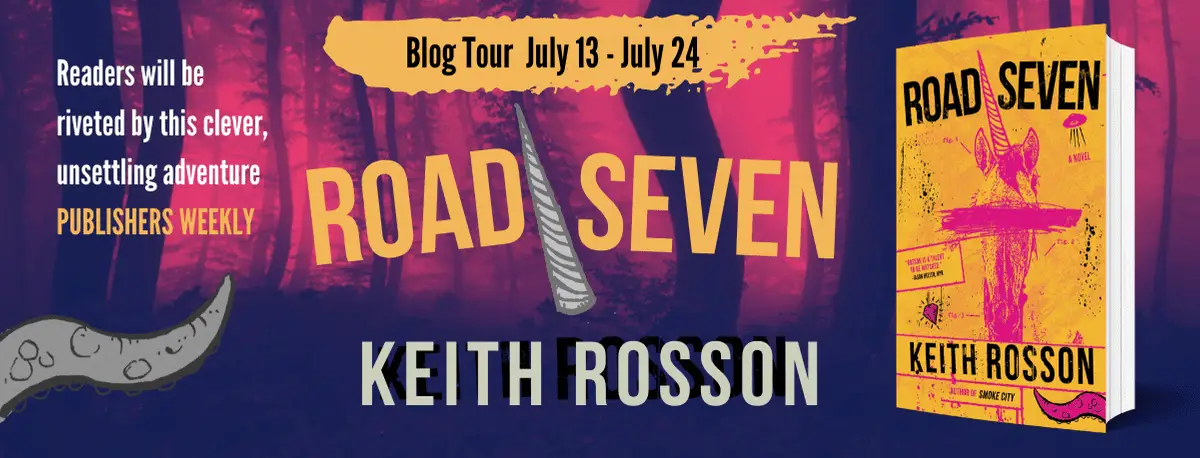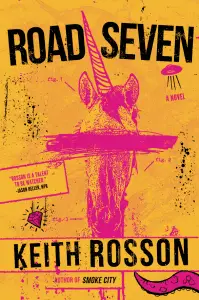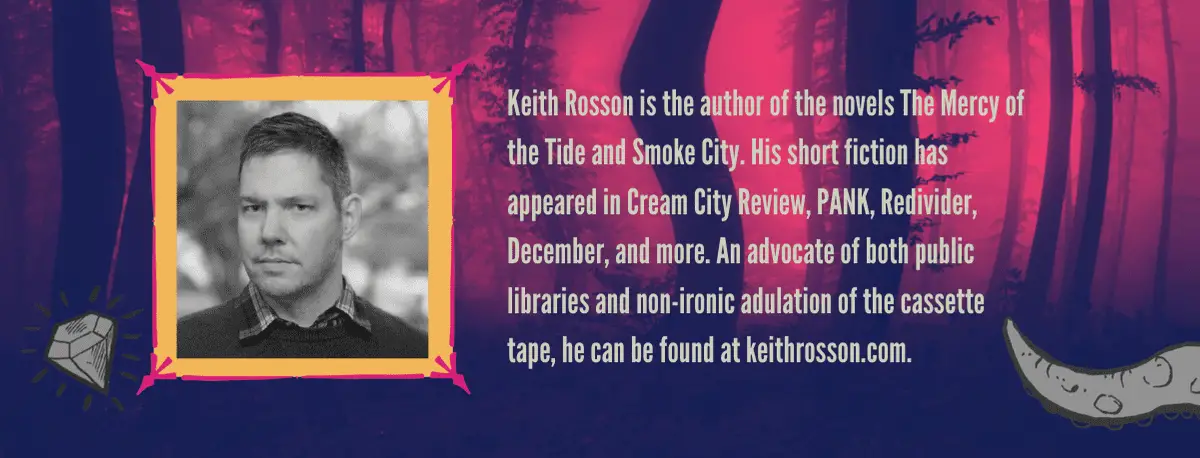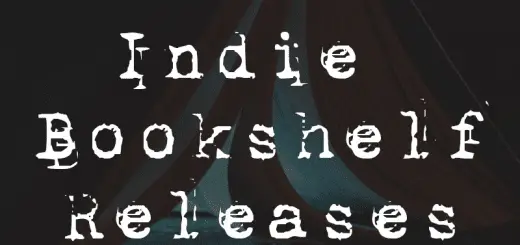Road Seven Blog Tour – Yes, But Where Do You Get Your Ideas?

Yes, But Where Do You Get Your Ideas?
My newest novel, Road Seven, is a kind of literary/cosmic horror/conspiracy novel, set in a remote (and entirely fictional) island called Hvildarland, off the coast of Iceland. The novel is literary in the sense that character remains as important as plot. Cosmic horror in that there may be ghosts, unicorns, aliens, and monsters – real or imagined – that play integral parts within the book. And conspiracy in that a growing sense of unease and the unknown (hopefully) permeates the novel.
It was hard as hell to write. There were many times when I doubted I’d be able to finish it.
The book started, initially, as a short story, and I wrote the short story due to a group of three writing prompts that were given to me as part of an exercise in my writing group. An entire book, the impetus being three scraps of paper pulled out of a hat, while I drank beer with some other writer nerds.
Listen, there’s no sure, steadfast way to begin a novel, much less finish one. Or even a story, really. I know writers who have no shortage of ideas – they’re brimming with them. Their only hindrance is time, time, time. And oh how I envy them! Time is short for me as well, but so are ideas. I don’t know where they come from, I don’t know how to palpate the bastards into something living, I don’t know how to cultivate the story-bacteria. Once I have a first draft, yeah, I am a solid draftsman. I can carve and shape at will. Can slowly resuscitate a story into something decent. But that initial idea, I don’t know how it arrives. I have no Story Idea Machine that I can turn on. Every story I’ve ever written, be it a thousand words or a hundred thousand, is one that I’ve fought for tooth and nail to bring to life.
Road Seven will mark my third published novel, and with its publication I’m resolutely sure that I still don’t know what the hell I’m doing. I remain grateful that I was able to pull the book from the mire; like I said, this one did not come easily to me. My first book, The Mercy of the Tide, began with a deep dive into Oregon folklore and historical research into the nuclear proliferation of the 1980s. The second, Smoke City, started when I read a biography about Joan of Arc and read a fleeting paragraph about her executioner.
There’s no surefire formula, and that nefarious question, “Where do all your ideas come from?”, remains as vague now as it does when I first started writing. But I know one thing that regularly helps me as a writer: a writing group.
When I occasionally get asked for “advice” from less experienced writers, I don’t have a lot to offer. Write a lot. Read a lot. Steel yourself for rejection. Mostly importantly, though, a writer should foster the ability to accept critiques from other writers. That means letting your work stand in that odd half-light where you are accepting of potential changes and also hold on tight to the idea that your story is salvageable and good, that it says something. It’s a tough dance sometimes, but such a worthwhile one. Simply put, other writers can see flaws in your work that you can’t.
Writing groups are worthwhile for a lot of other reasons as well. For one, fellowship. Writing is oftentimes a lonely journey, and getting together with other folks who are in the same boat is such a gift. Camaraderie means a lot. A writing group also offers you a chance to write under deadline. This can be a hindrance to some folks, but most writers I know would rather bust something out that’s in “workable draft mode” than tinker with the same five or ten pages into oblivion. A writing group forces you to present something, and presenting it to the group brings it that much closer to being done. And that’s really the goal, isn’t it? Finishing the thing, whatever it is?
Fellowship, commitment, aiding in the creative process – all benefits of a writing group. I mean, I can honestly say that my new novel is out in the world now because of a writing exercise I did with mine years before. For someone who has to yank and pull every idea screaming from the mire of his subconscious, that’s a pretty good deal.
Oh, and the three writing prompts I got: 1) A secret. 2) A unicorn. 3) Sex in a pumpkin patch.
You’ll have to read Road Seven to find out if they all made it into the book.

ROAD SEVEN by Keith Rosson
RELEASE DATE: 7/14/20
GENRE: Magical Realism, Fantasy, Literary
BOOK PAGE: https://www.meerkatpress.com/
SUMMARY:
Road Seven follows disgraced cryptozoologist Mark Sandoval—resolutely arrogant, covered head to foot in precise geometric scarring, and still marginally famous after Hollywood made an Oscar-winner based off his memoir years before—who has been strongly advised by his lawyer to leave the country following a drunken and potentially fatal hit and run. When a woman sends Sandoval grainy footage of what appears to be a unicorn, he quickly hires an assistant and the two head off to the woman’s farm in Hvíldarland, a tiny, remote island off the coast of Iceland. When they arrive on the island and discover that both a military base and the surrounding álagablettur, the nearby woods, are teeming with strangeness and secrets, they begin to realize that a supposed unicorn sighting is the least of their worries. Road Seven will mark the third of Rosson’s novels to be published by Meerkat Press.
BUY LINKS: Meerkat Press | Indiebound.org | Amazon | Barnes & Noble
EXCERPT
It was a help wanted ad from a monster hunter.
The monster hunter, really, if such a term could ever be said out loud without at least a little wince, a self-conscious roll of the eyes. Its arrival came via a forwarded link from Ellis, who in the subject line wrote: Aren’t you into this guy?
It was a spring evening and Brian sat in his room, enveloped in the encroaching night, cradled in his usual pain. A few moths flitted in mortal combat against his window screen, and Brian had the napalm grays going on, had that deep and familiar knife-throb in the skull. The Headache That Lived Forever. Still, Ellis’s line made him smile. Brian heard him downstairs in the kitchen yelling to Robert over the music, cupboard doors slamming closed. They were making drinks—pregame warmups, Ellis called them—before the three of them went out to get stupid, or what passed for stupid these days. Brian was already thinking of ways to bail—his head, when it got like this, in this kind of slow, heated roil, like a halo of barbs being cinched tighter and tighter, alcohol was no good for it.
Down the hall in the bathroom, he dropped a trio of aspirin into his palm and chewed them while he gazed at his face in the mirror. Three would maybe take the edge off, turn the headache from a sharp blade scraping along the bowl of his skull to a dull one. That was about it; you could grow used to anything. He leaned close and gazed at the galaxy of burst blood vessels in one eye.
Back in his room, bass-heavy nü metal ghosting through the floorboards, Robert bellowed laughter in response to something Ellis said. Brian sat back down, looked at the screen of his laptop. His bare feet on the wood floor, the occasional draft from the window fluttering the curtains. The moths outside, insistent and hopeful. Here was spring in Portland: the scent of cut grass, the blat of a car alarm, the creak of a shifting, old, many-roomed house. Ellis’s place he’d inherited from his parents; Brian had been his roommate since they were undergrads.
His desk was choked with stacks of accordion folders, mugs of pens. Outdated anthro journals he kept telling himself he’d read someday. He clicked on the link Ellis had sent, and it took him to a cryptozoology website, and not one of the good ones. Not one of the ones that Brian sometimes cruised (with only the slightest tinge of embarrassment), ones that tended to mirror or replicate the “reputable” sciences. No, this one, menandmonsterz.com, had all the trappings of the technologically inept and socially unhinged: woefully pixilated photos, a dizzying array of fonts stacked and butting up against each other. There was a link, holy shit, to a Myspace page. What If Leprechauns, one headline blared in what was almost certainly Papyrus font, Were Really Pre-Stone Age Hominids!?! This, alongside a fan-art illustration of the Lucky Charms leprechaun leering and holding a stone ax in each hand. Beneath that, a banner ad for hair regeneration. The type of site, honestly, that made antiviral software programmers rich.
And yet, the next part snagged him:
The Long Way Home author, alien abductee, famed cryptozoologist, and renowned cultural anthropologist Mark Sandoval is on the hunt for a research assistant. And maybe it’s YOU!
He snorted at the “cultural anthropologist” part and scrolled down past the iconic cover of The Long Way Home, Sandoval’s memoir about his alien abduction (the image was a tiny human figure enveloped in a cone of light from some unseen but brilliant overhanging light source, the same image they’d used for the movie) and then past Sandoval’s Hollywood-quality headshot. It continued:
Mark Sandoval is looking for a research assistant to accompany him on a site visit outside of the US. Position is confidential and time-sensitive. Terms and compensation commensurate with experience. Visit marksandoval.com to apply.
“Brian!” Ellis bellowed from downstairs. “Get your pregame drink on, dear heart! Let’s do this shit!”
“We’re making the most terrible drinks we can,” warbled Robert.
Brian typed in the address to Sandoval’s website, and it was a much nicer affair. Professional, clean, and surprisingly understated, considering the man claimed to have at one time literally traded punches with a chupacabra. And there was the ad—the same exact information, with a Click to Apply button at the bottom. Vague as hell. Had the air of haste to it, something quickly cobbled together. But he clicked on it, scratched his chin with his thumbnail. Pressed three fingers against his eyelid, felt the sick, familiar throb in the hidden meat behind his eye. He quickly typed in the various fields—name, email address, phone number—and confirmed that he did indeed have a valid passport. Then he uploaded his CV, which he had at the ready because this, of course, was not remotely the first time Brian Schutt had dicked around with the notion of ditching everything in regard to his future. No, this was not the first time at all.

ABOUT THE AUTHOR: Keith Rosson is the author of the novels The Mercy of the Tide and Smoke City. His short fiction has appeared in Cream City Review, PANK, Redivider, December, and more. An advocate of both public libraries and non-ironic adulation of the cassette tape, he can be found at keithrosson.com.











